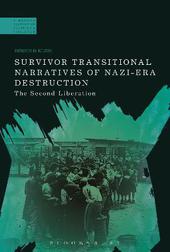
|
Survivor Transitional Narratives of Nazi-Era Destruction: The Second Liberation
Hardback
Main Details
| Title |
Survivor Transitional Narratives of Nazi-Era Destruction: The Second Liberation
|
| Authors and Contributors |
By (author) Professor Dennis B. Klein
|
| Series | A Modern History of Politics and Violence |
|---|
| Physical Properties |
| Format:Hardback | | Pages:288 | | Dimensions(mm): Height 234,Width 156 |
|
| Category/Genre | The Holocaust |
|---|
| ISBN/Barcode |
9781350037144
|
| Classifications | Dewey:940.53180922 |
|---|
| Audience | | Tertiary Education (US: College) | |
|---|
|
Publishing Details |
| Publisher |
Bloomsbury Publishing PLC
|
| Imprint |
Bloomsbury Academic
|
| Publication Date |
16 November 2017 |
| Publication Country |
United Kingdom
|
Description
Survivor Transitional Narratives of Nazi-Era Destruction: The Second Liberation examines the historical circumstances that gave rise in the 1960s to the first cohort of Nazi-era survivors who massed a public campaign focusing on remembrance of Nazi racial crimes. The survivors' decision to engage and disquiet a public audience occurred against the backdrop of the Frankfurt Auschwitz trial and the West German debate over the enforcement of statutory limitations for prosecuting former Nazis. Dennis B. Klein focuses on the accounts of three survivors: Jean Amery, an Austrian ex-patriot who joined the Belgian Resistance during the war, Vladimir Jankelevitch, a member of the French Resistance, and Simon Wiesenthal, who dedicated his life after the war to investigating Nazi crimes. As Klein argues, their accounts, in addition to acting as a reminder of Nazi-era endemic criminality, express a longing for human fellowshipThis contextual and interdisciplinary interpretation illustrates the explanatory significance of contemporary events and individual responses to them in shaping the memory and legacy of Nazi-era destruction. It is essential reading for students and scholars of the Nazi era and its legacy, genocide studies, Jewish Studies, and the history of emotions.
Author Biography
Dennis B. Klein is Professor of History, Director of the Master of Arts in Holocaust and Genocide Studies program, and Director of the Jewish Studies Program at Kean University, USA. He is also the founding director of the Anti-Defamation League's Braun Center for Holocaust Studies. He is the author of Jewish Origins of the Psychoanalytic Movement (University of Chicago Press, 1985) and the editor of Societies Emerging from Conflict: The Aftermath of Atrocity (forthcoming).
ReviewsThe book's importance can be found in the way in which complexity, ambiguity and occasionally contradiction in survivor accounts, are dealt with. Nuanced readings and analyses, both of the three primary authors's works and a significant array of always relevant secondary literature, inform the impressive scholarship behind the book ... [It] does not shy away from complexity and this is its strength. * Social History * In this insightful and nuanced book, Dennis Klein highlights the relevance of Holocaust testimony and survivor narrative. His unique approach points specifically to Holocaust narratives as "transitional", enabling survivors to be subjects in a collective and shared humanism of the future, in which they and their memories remain constitutive partners in the rethinking of politics, human rights, and global social responsibility. * Kitty Millet, Professor of Modern Jewish Thought and Comparative Jewish Literatures, San Francisco State University, USA * A truly original and provocative study of how key survivor narratives emerged in the Jewish and wider public in the 1960s-and why they remain significant. It will be appreciated and acclaimed by a wide array of students and scholars from disciplines spanning the humanities and social sciences. * Michael Berkowitz, Professor of Modern Jewish History, University College London, UK * Accordingly, not only is this study essential reading for scholars of Holocaust and genocide studies, Jewish studies, and Memory studies, but for students and those working in retributive justice, trauma, and conflict aftermath ... [The] book's analytical techniques are unassailable, and Klein's theoretical insights provide an illuminating window into the texts under discussion. * Holocaust Studies *
|